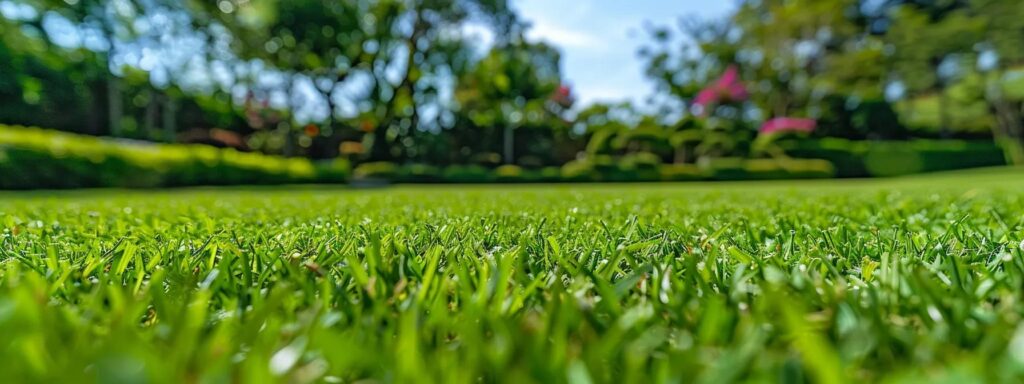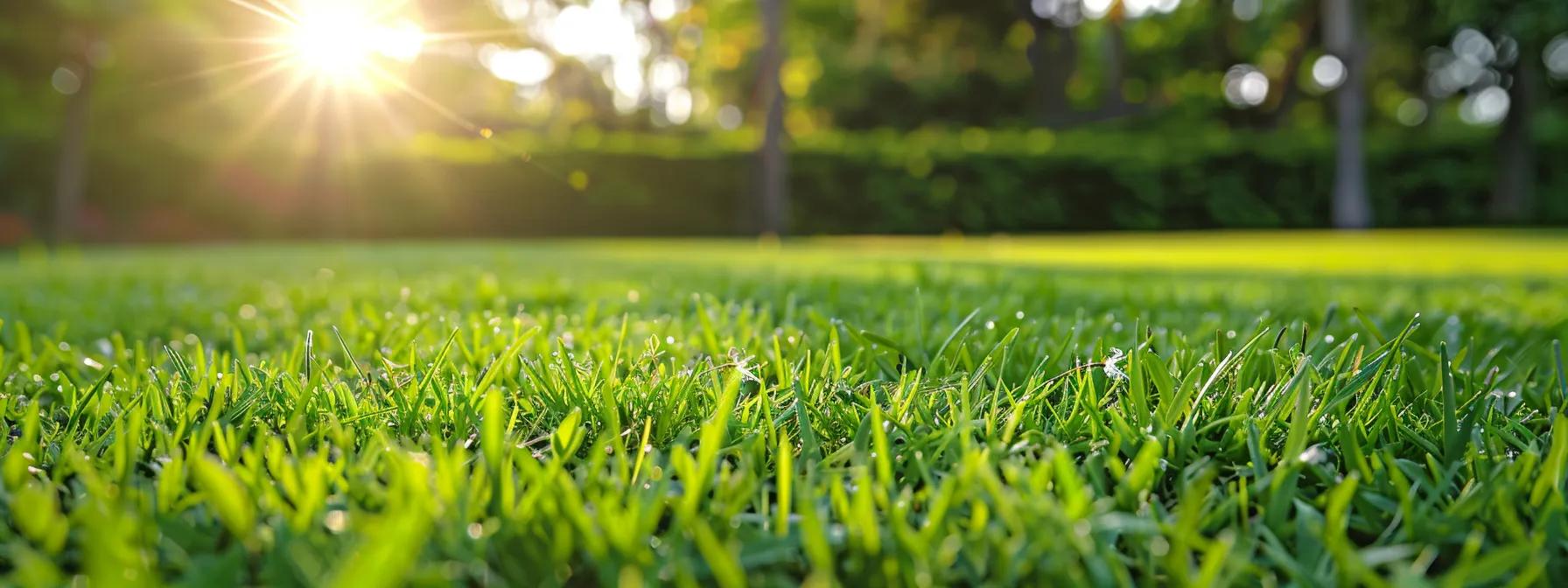Table Of Contents:
- Understanding Organic Lawn Mowing Services
- Comparing Organic Lawn Mowing to Traditional Approaches
- Health Benefits of Organic Lawn Mowing
- Economic Aspects of Organic Lawn Mowing Services
- Customer Testimonials on Organic Lawn Mowing
- Customer Testimonials on Organic Lawn Mowing
- Choosing the Right Organic Lawn Mowing Service
- Conclusion
Many homeowners question whether organic lawn mowing services are better than traditional methods. This article will explore the differences between these approaches, focusing on health benefits, economic impacts, and real customer testimonials. By understanding these factors, readers can make informed decisions that not only enhance their landscape but also promote a safe environment free from harmful diseases and pests like beetles. Engaging with this content will help solve the challenge of maintaining a healthy lawn while considering the overall benefits of proper irrigation and aeration practices.
Understanding Organic Lawn Mowing Services

Organic mowing practices focus on maintaining lawn health through natural methods, emphasizing topsoil enrichment and the importance of conducting a soil test. Key components of organic lawn care include the use of mulch and leaf recycling to promote a thriving natural environment. Additionally, organic fertilizers play a crucial role in nourishing the lawn while supporting overall ecosystem health.
Defining Organic Mowing Practices
Organic mowing practices represent a proactive approach to lawn care that prioritizes soil health and the overall ecosystem. This method incorporates sustainable landscaping techniques, which focus on nurturing the soil through natural processes. By enriching the topsoil and encouraging organic matter, lawns become more resilient and capable of thriving without reliance on synthetic inputs.
In organic lawn care, maintaining a balanced ecosystem is essential. Integrated pest management strategies help control insect populations without chemicals, allowing beneficial insects to flourish. This natural approach not only enhances the health of the lawn but also supports local wildlife, creating a more dynamic outdoor space.
Pruning and proper mowing techniques are integral components of organic lawn mowing. Using sharp blades and cutting at the right height promotes grass health and encourages deeper root systems. Moreover, the application of organic fertilizers, derived from natural materials, ensures that lawns receive the nutrients they need while sustaining the environment’s integrity.
Key Components of Organic Lawn Care
In organic lawn care, a primary focus is on enhancing soil health, which acts as the foundation for a flourishing landscape. Practices such as composting and aeration introduce vital organic matter back into the ground, resulting in improved nutrient availability and better water retention. Homeowners often witness more robust grass growth, reducing the need for chemical fertilizers, which can harm local ecosystems.
Another key component is the promotion of beneficial insects, often referred to as pollinators, that play essential roles in horticulture. By implementing integrated pest management strategies, organic mowing services naturally maintain pest populations, allowing beneficial species to thrive. This balance not only leads to healthier lawns but also supports biodiversity in the environment.
Lastly, organic lawn care emphasizes the importance of proper mowing techniques. Cutting grass at the appropriate height and maintaining sharp blades can boost grass resilience while minimizing stress and disease susceptibility. This approach leads to a sustainable lawn that requires less water and fewer inputs, making it appealing to homeowners across diverse zip code areas who value eco-friendly practices.
Environmental Benefits of Organic Methods
The adoption of eco lawn mowing methods provides significant environmental benefits, particularly in areas like mosquito control. By utilizing organic practices, property owners can create a healthier yard environment that naturally repels mosquitoes, reducing the need for chemical treatments that can harm beneficial insects and local wildlife.
Organic lawn care practices significantly reduce pollution caused by chemical fertilizers and pesticides. Traditional lawn care often relies on synthetic inputs, which can leach into water systems and contribute to environmental degradation. In contrast, organic methods typically utilize nitrogen-rich compost and natural fertilizers, enhancing soil quality while minimizing harmful runoff into nearby waterways.
The Role of Organic Fertilizers in Lawn Health
Organic fertilizers play a vital role in maintaining lawn health by providing essential nutrients through natural sources. These fertilizers, such as compost and manure, not only nourish the grass but also enhance the soil structure, leading to improved moisture retention. Homeowners in Maryland looking for eco-friendly lawn mowing solutions will find that organic options help create a resilient lawn less susceptible to pests like fire ants and mosquitoes.
The application of organic fertilizers creates a balanced ecosystem that is beneficial for local wildlife. Unlike traditional chemical fertilizers, organic variants promote an environment where beneficial insects can thrive, helping to naturally control pest populations. For homeowners concerned about chemical exposure, opting for organic choices simplifies lawn care while supporting a healthier outdoor space.
Pricing for organic fertilizers often reflects their sustainability and effectiveness in enriching the lawn. Many homeowners may find that while the initial investment is slightly higher, the long-term benefits such as reduced dependency on chemicals and a sustainable lawn increase the overall value. This aligns with the growing trend towards eco-friendly lawn mowing practices, highlighting the importance of making environmentally responsible choices for a healthier landscape.
Organic lawn mowing offers a fresh way to care for grass, using natural methods that benefit the earth. Yet, it raises questions about how it stacks up against traditional techniques; let’s look closely at both.
Comparing Organic Lawn Mowing to Traditional Approaches

Organic lawn mowing practices significantly differ from traditional approaches, particularly regarding chemical usage. Traditional methods often lead to air pollution and reliance on synthetic inputs, while organic techniques prioritize sustainability, enriching soil health through organic matter. The focus on water conservation and natural pest control strategies fosters a healthier ecosystem, creating a thriving landscape supported by robust seed growth and reduced chemical exposure.
Differences in Chemical Usage
Traditional lawn mowing methods often rely on synthetic fertilizers and pesticides, which can introduce harmful chemicals into the ecosystem. These chemicals may contribute to issues such as air pollution and soil depletion, negatively affecting the overall health of the lawn. On the other hand, organic mowing practices emphasize the use of natural inputs, significantly reducing the risk of contamination from harmful agents that can harm beneficial soil organisms crucial for supporting healthy germination.
The presence of synthetic chemicals in conventional lawn care can escalate problems related to pests like fleas and fungus. These treatments may offer immediate relief but often lead to a cycle of dependency on harsh chemicals. In contrast, organic methods utilize treatments derived from natural materials, significantly decreasing pest populations without compromising environmental integrity, leading to a more stable and resilient lawn.
Furthermore, organic lawn care promotes healthier soil through its chemical-free approach, benefiting long-term grass growth and vitality. The absence of synthetic chemicals encourages diverse microbial life, which plays a vital role in nutrient delivery and pest management. Consequently, homeowners can enjoy a lush, thriving lawn that is environmentally friendly, all while minimizing chemical exposure and enhancing the overall landscape‘s resilience against pests and diseases.
Impact on Soil Health and Ecosystem
Organic lawn mowing techniques significantly contribute to soil health by enhancing the natural ecosystem. The use of organic inputs, such as corn gluten meal, not only nourishes grass but also benefits soil structure. This natural approach encourages beneficial microbial activity, which aids in nutrient cycling, improves soil aeration, and enhances moisture retention.
In contrast, traditional lawn care often relies on synthetic herbicides and fertilizers that can degrade soil quality over time. These chemicals may harm beneficial organisms essential for a thriving landscape, leading to reduced soil vitality. Maintaining a lawn without reliance on these harsh agents promotes a healthier environment for shrub and grass growth, ensuring resilience against pests and diseases.
Furthermore, organic lawn care practices minimize noise pollution associated with frequent mechanical mowing and chemical applications. By implementing more sustainable mowing schedules and techniques, homeowners can enjoy a quieter outdoor space that supports local wildlife and enhances the overall landscape. This holistic approach not only improves aesthetic appeal but also creates a more balanced ecosystem that benefits both property owners and the environment.
Water Conservation Benefits of Organic Techniques
Organic lawn mowing techniques promote water conservation by enhancing soil structure through practices such as composting. Healthy soil retains moisture effectively, reducing the frequency of irrigation. This natural approach helps maintain consistent hydration in the lawn, minimizing the need for excessive watering that is often seen with traditional methods relying on synthetic fertilizers.
Utilizing organic practices encourages the growth of clover and other beneficial plants that contribute to a healthier ecosystem. These plants require less water than conventional grasses and naturally suppress weeds. By promoting a diverse plant community, homeowners can experience reduced water usage while maintaining a vibrant and lush lawn.
Moreover, organic pest control methods decrease the reliance on pesticides that can disrupt soil moisture levels and overall health. By fostering a balanced environment where beneficial insects thrive, organic techniques not only support a robust ecosystem but also contribute to effective weed control. This holistic strategy ensures sustainable water management, making organic lawn care a practical choice for environmentally conscious homeowners.
Pest Control Strategies in Organic Mowing
In organic lawn care, pest control strategies focus on maintaining a healthy ecosystem that supports beneficial insects rather than relying on chemical pesticides. Utilizing natural fertilizers, like corn gluten meal, not only nourishes the sod but also acts as a deterrent against common pests. This approach fosters a balanced landscape design where the natural habitats of good insects are preserved, helping to control pest populations effectively.
Integrated pest management (IPM) is a critical strategy within organic mowing practices. This technique involves monitoring pest populations and implementing targeted solutions, aiming to minimize disruption to beneficial species. For instance, introducing companion plants and maintaining healthy nutrient levels in the soil enhances the lawn‘s resilience, reducing the likelihood of pest infestations while promoting a vibrant outdoor space.
The effectiveness of organic pest control ultimately results from reverting to natural methods rather than synthetic solutions. By selecting the right organic fertilizers and employing techniques like cover cropping, homeowners can create a robust lawn ecosystem. This not only leads to healthier growth but also alleviates concerns regarding chemical residues, allowing for a safer outdoor environment that meets the needs of both people and wildlife alike.
Traditional methods shape lawns, but they can carry hidden costs. In contrast, organic lawn mowing not only nurtures the grass but also brings significant health benefits that deserve attention.
Health Benefits of Organic Lawn Mowing

The health benefits of organic lawn mowing extend beyond aesthetics, emphasizing reduced chemical exposure for families and pets. By utilizing natural alternatives like gluten and iron-based fertilizers, property owners can promote a safe outdoor environment. Furthermore, this approach enhances long-term soil and plant health, ensuring a vibrant landscape that nurtures both humans and wildlife. Each of these aspects plays a critical role in fostering a truly sustainable lawn care experience.
Reduced Chemical Exposure for Families and Pets
Opting for organic lawn mowing methods significantly reduces the chemical exposure that families and pets face in their outdoor environments. Traditional lawn care often employs synthetic fertilizers and pesticides that leave harmful residues, which can pose risks to health. By choosing organic practices, property owners create a safer yard where loved ones can enjoy their time without the worry of chemical-related illnesses.
Furthermore, organic lawn care supports healthier ecosystems, contributing to a cleaner environment for families and their pets. For example, natural fertilizers such as compost and manure contain nutrients essential for grass growth without the toxic side effects of chemicals. This not only promotes a robust lawn but also creates a vibrant habitat for beneficial insects, enhancing the overall health of the outdoor space.
Promoting a Safe Outdoor Environment
Choosing organic lawn mowing services fosters a safer outdoor environment for families and pets. By eliminating the use of synthetic fertilizers and pesticides, organic practices reduce exposure to harmful chemicals, making it a suitable option for families with young children or pets who enjoy outdoor activities. This approach not only safeguards the well-being of loved ones but also promotes a more natural and healthy ecosystem.
Many homeowners report improved peace of mind when switching to organic lawn care methods. The use of natural fertilizers and pest control strategies supports healthy grass growth without the toxic residues associated with traditional mowing techniques. This shift encourages families to spend more time outside, knowing their environment is free from harmful agents that can impact their health.
Additionally, organic lawn care contributes to a thriving habitat for beneficial insects and wildlife. By promoting a balanced ecosystem, property owners can enjoy a vibrant outdoor space that not only enhances the beauty of their landscape but also supports local biodiversity. Ultimately, these practices create a safe and inviting environment that aligns with the health and well-being of families and the surrounding ecosystem.
Long-Term Soil and Plant Health
Long-term soil health is a critical aspect of organic lawn mowing that sets it apart from traditional practices. By utilizing natural fertilizers, such as compost and manure, organic methods enhance soil structure and promote healthy microbial activity. This leads to improved nutrient cycling and moisture retention, which are essential for sustaining robust plant growth over time.
In contrast to conventional lawn care methods that often rely on synthetic inputs, organic practices foster a resilient ecosystem. Healthier soil supports diverse plant life, creating a lush, vibrant lawn with reduced vulnerability to pests and diseases. Property owners often find that their organic lawns require fewer interventions, leading to a more sustainable and manageable outdoor space.
Furthermore, the focus on organic lawn care results in profound long-term benefits for both soil and plants. As the soil improves, it can better support grass and other plants, ensuring they thrive without the need for harmful chemicals. Ultimately, homeowners can enjoy a more sustainable lawn that contributes positively to the environment, aligning with the growing demand for eco-friendly landscaping solutions.
The health of a lawn goes hand in hand with its cost. Understanding the economic side of organic mowing reveals why it matters to both the earth and your wallet.
Economic Aspects of Organic Lawn Mowing Services

The economic aspects of organic lawn mowing services present a compelling case when compared to traditional methods. Analyzing cost differences reveals that while organic options might have a higher initial investment, they often lead to long-term savings in maintenance and chemical purchases. Sustainable lawn care practices not only promote healthier ecosystems but yield lasting results, ultimately benefiting homeowners financially and environmentally.
Cost Analysis of Organic vs. Traditional Services
When comparing the cost of organic versus traditional lawn mowing services, it is vital to consider both immediate and long-term expenses. Organic lawn care typically involves a higher upfront investment due to the use of natural fertilizers and sustainable practices. However, many homeowners find that this initial cost is offset by the reduced frequency of chemical purchases and lower maintenance needs over time, leading to substantial savings.
Another economic advantage of organic lawn mowing is its potential to increase property value. Well-maintained organic lawns often enhance curb appeal, attracting buyers interested in eco-friendly properties. Homeowners invest in organic services to create a lush, healthy landscape, which can yield a better return on investment when selling their home.
Additionally, the long-term benefits of organic lawn care extend to environmental savings. By reducing reliance on synthetic fertilizers, property owners minimize the risk of water pollution caused by chemical runoff. This not only supports local ecosystems but also lessens the financial burden on municipal water systems, ultimately creating a more sustainable approach to lawn maintenance with lasting economic advantages.
Value of Sustainable Lawn Care
Sustainable lawn care offers significant economic advantages, particularly for homeowners looking to reduce long-term maintenance costs. By employing organic practices, property owners can minimize their reliance on synthetic fertilizers and pesticides, which can be expensive and require frequent applications. This shift leads to lower overall spending while enhancing the health of the lawn.
Investing in sustainable lawn care can also increase property value. Homeowners with well-maintained organic lawns often see improved curb appeal, making their property more attractive to potential buyers. As environmental awareness grows, many buyers prefer homes with eco-friendly landscapes, providing further justification for adopting organic mowing methods.
The economic benefits of organic lawn care extend to the environment as well. By reducing chemical runoff, property owners contribute to healthier local ecosystems, which can decrease municipal costs associated with water treatment and pollution. This long-term perspective on lawn care not only presents substantial savings but also supports the overall well-being of the community.
Long-Lasting Results and Maintenance Savings
Organic lawn mowing services often lead to long-lasting results, allowing homeowners to enjoy a lush and healthy lawn without the continuous application of synthetic fertilizers. By promoting healthier soil through natural amendments, organic practices create a more resilient grass that thrives over time. This stability reduces the frequency of maintenance interventions, ultimately saving property owners money and effort in the long run.
In contrast to traditional methods, organic lawn care often requires fewer inputs, as healthier grass can better withstand common pests and diseases. For instance, well-maintained organic lawns can resist infestations without the need for chemical treatments, which minimizes maintenance costs. As homeowners witness reduced reliance on chemical inputs, they often find their overall lawn care expenses decreasing significantly over the years.
Additionally, the lasting effects of organic lawn mowing can influence property value positively. A vibrant, well-kept organic lawn can enhance curb appeal, making properties more attractive to potential buyers. This increased visual appeal serves as a long-term investment, as a healthier landscape not only enriches the environment but also supports financial returns for homeowners who prioritize sustainable lawn care practices.
People have started to notice the benefits of organic lawn mowing. Their stories reveal how these services have changed their properties and their lives.
Customer Testimonials on Organic Lawn Mowing

Customer Testimonials on Organic Lawn Mowing
Real experiences from organic lawn care users highlight the significant benefits of this approach. Case studies of successful organic lawn transformations reveal how homeowners have achieved vibrant landscapes while reducing chemical usage. Additionally, behavioral changes in lawn care choices demonstrate a growing preference for sustainable practices. Each of these aspects showcases the practical value of adopting organic mowing methods.
Real Experiences From Organic Lawn Care Users
Many homeowners who have transitioned to organic lawn care report noticeable improvements in their lawns. One user, who switched from traditional methods, found that their grass became more robust and vibrant after adopting organic practices. This change not only boosted the lawn‘s appearance but also reduced their concerns about chemical exposure affecting their children and pets.
Another homeowner shared their experience of reduced maintenance needs after implementing organic techniques. By focusing on natural fertilizers and pest control, they noticed fewer issues with weeds and pests, allowing them to spend less time on lawn care. This shift to organic methods led to a healthier yard while also providing peace of mind regarding environmental impacts.
Case Studies of Successful Organic Lawn Transformations
One local homeowner in Michigan shared their experience after transitioning to organic lawn mowing practices, emphasizing the dramatic transformation of their landscape. With a focus on natural fertilizers and sustainable techniques, their once-chemical-dependent lawn flourished into a vibrant green space, showcasing the benefits of nurturing soil health. This shift not only enhanced the lawn‘s aesthetic but also brought peace of mind regarding the safety of their children and pets playing outdoors.
Another commendable case involved a family that struggled with frequent pest invasions in their traditional lawn. After engaging an organic lawn care service, they implemented integrated pest management strategies alongside natural fertilizers. As a result, the lawn not only became healthier, but the pest issues subsided significantly, showing how organic methods can lead to more resilient landscapes and reduce reliance on harmful chemicals.
A third example highlights a homeowner who previously invested heavily in synthetic treatments yet faced ongoing lawn challenges. After making the switch to organic mowing, they experienced reduced maintenance time and costs due to improved grass health and soil vitality. This transformation underscores how organic practices can create a self-sustaining lawn, resulting in both financial and environmental benefits over time.
Behavioral Changes in Lawn Care Choices
As more homeowners become aware of the detrimental effects of synthetic lawn care products, many are shifting toward organic practices. This transition reflects a growing commitment to creating healthier environments for families and pets. By adopting organic lawn care methods, property owners report enhanced lawn vitality, resulting in deeper roots and more resilient grass that thrives naturally.
Homeowners who previously relied on chemical treatments are increasingly embracing organic options, observing significant behavioral changes in their lawn care routines. They emphasize products derived from natural sources, such as compost and organic fertilizers, which not only nourish the grass but also enhance soil quality. This shift not only reduces chemical exposure but also fosters a sense of responsibility toward maintaining a sustainable ecosystem.
In many cases, homeowners have discovered that practicing organic mowing leads to a notable decrease in long-term maintenance efforts. By nurturing soil health and promoting beneficial insects, property owners find their lawns become more self-sufficient, requiring less frequent intervention. This proactive approach not only saves time but also aligns with the desire for environmentally friendly practices, creating outdoor spaces that are both beautiful and healthy.
Customers speak of the freshness that comes with choosing organic lawn care. Now, it’s time to consider how to find the right service for your needs.
Choosing the Right Organic Lawn Mowing Service

When selecting an organic lawn mowing service, homeowners should consider several key factors to ensure quality care. Important topics to explore include what to look for in organic lawn care providers, questions to ask before hiring a service, and understanding certifications and standards in organic care. These insights will help align expectations with reliable practices for a healthy lawn.
What to Look for in Organic Lawn Care Providers
When selecting an organic lawn care provider, it is essential to assess their knowledge of sustainable practices and products. A reputable service should offer expertise in composting, natural fertilizers, and integrated pest management, demonstrating a commitment to enhancing lawn health without harmful chemicals. Understanding these practices not only assures quality care but also aligns with the homeowner’s values of promoting an eco-friendly environment.
Another critical aspect is the transparency of the company regarding its methods and materials. Homeowners should inquire about the specific organic products being used, ensuring they are derived from natural sources that support lawn and soil health. A trustworthy provider will be open about their techniques, as well as any certifications they hold that demonstrate compliance with organic standards.
Finally, evaluating customer feedback and testimonials is vital in the decision-making process. Positive reviews from previous clients can provide insight into the company’s reliability and effectiveness in delivering organic lawn care services. Engaging with a provider that has a solid reputation not only instills confidence but also enhances the likelihood of achieving a vibrant and healthy lawn that stands in contrast to traditional mowing methods.
Questions to Ask Before Hiring a Service
Homeowners should inquire about the specific organic practices utilized by the lawn care service. Understanding how the company implements sustainable methods can provide insight into their effectiveness and commitment to eco-friendly lawn care. For instance, asking about the types of organic fertilizers and pest control strategies they employ will help gauge whether their services align with the homeowner’s environmental values.
It is equally important to ask about the experience and qualifications of the service team. Homeowners benefit from working with professionals who have a thorough knowledge of organic lawn care techniques. Inquiring about any certifications the staff holds can assure clients that the service provider is well-versed in the best practices for maintaining healthy lawns without harmful chemicals.
Finally, engaging in a conversation about pricing and service contracts can help homeowners understand the financial commitment involved. Asking whether the service offers flexibility in scheduling, such as seasonal plans or one-time treatments, allows homeowners to select options that best fit their needs and budgets. This transparency helps establish clear expectations and fosters a sense of trust between the homeowner and the lawn care provider.
Understanding Certifications and Standards in Organic Care
Understanding certifications and standards in organic lawn care is essential for homeowners seeking the right organic mowing service. Certifications from recognized organizations ensure that the lawn care provider adheres to sustainable and eco-friendly practices. This not only guarantees the effective use of organic fertilizers and pest control methods but also reassures clients of the provider’s commitment to protecting local ecosystems while maintaining healthy lawns.
Homeowners should look for specific certifications, such as those from the Organic Materials Review Institute (OMRI) or the United States Department of Agriculture (USDA). These certifications indicate that the products and practices used meet established organic standards, thereby reinforcing the integrity of the organic lawn care service. By choosing a provider with verified credentials, homeowners can feel confident that their lawn will receive the best care without harmful chemicals.
Moreover, beyond certifications, understanding a company’s methods can enhance the homeowner’s confidence in their choices. Engaging with providers about their organic practices, such as composting and integrated pest management strategies, helps clarify how these methods contribute to a sustainable lawn. Therefore, this knowledge empowers homeowners to make informed decisions that align with their values and promote a healthy outdoor environment.
Conclusion
The benefits of organic lawn mowing far outweigh traditional methods by promoting healthier ecosystems, reducing chemical exposure, and enhancing soil vitality. Homeowners experience long-term savings through lower maintenance costs and reduced reliance on harmful chemicals, making organic practices a practical choice for sustainable landscaping. By choosing organic options, property owners not only foster vibrant, resilient lawns but also contribute positively to the environment. Embracing organic lawn care ultimately aligns with the growing need for eco-friendly solutions that ensure a safer and healthier outdoor space for families and wildlife.

